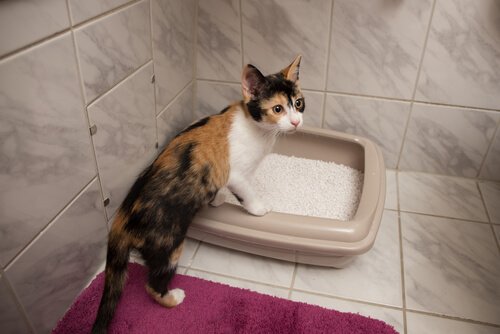Bringing a Kitten Home: What Do You Need?


Written and verified by the lawyer Francisco María García
If you’re going to offer a kitten a comfortable home and proper care to keep him healthy, then you need to prepare yourself beforehand. In this article, you can read about everything that you need to know before bringing a kitten into your home.
Adjusting your home to provide the right temperature for your cat
Kittens are not able to regulate their own body temperature during the first weeks of life, which makes them vulnerable to experience hypothermia or lung problems.
This is why it’s fundamental to provide a comfortable temperature in your home before bringing a kitten into your home. It’s best to keep the household temperature between 21 and 24°C.

One excellent option for providing your kitten with heat is to buy them an electric cushion with controllable temperature.
Preparing the Ideal Place for Your Kitten
Before bringing a cat home, you need to make sure that you prepare its own space, a place where your new friend can feel safe, rest, and grow up healthily.
Kittens sleep more than 12 hours a day. It’s really important that they have a comfortable bed to sleep in. Obviously, any space for your kitten should be kept clean, dry, and warm.

Your new friend will also need a place to eat and another place for him to use the litter box. Felines are very critical about their hygiene and food. Therefore, these two places should never be side by side.
Make sure that their food and water bowl are the right size for them as well. It’s a good idea to have these bowls made out of materials that are easy to clean and have antibacterial properties.
When it comes to their litter box, the most important thing is the quality of the absorbent litter. There are many options you can pick from at the store. However, we recommend bentonite-based brands.
Hygiene
Felines are very independent and careful with their hygiene because they have an innate need of keeping their body healthy.
Stimulation and Cleanliness of the Urinary and Excretory Tracts
A new-born kitten isn’t able to control its bladder and bowel movement properly. Normally, in nature, the mother would lick their private parts to stimulate them.
If your kitten is less than 12 weeks old, you’ll need to sanitize him before and after each meal. You can use a cotton wool pad or a gauze pad dipped in warm water. After this stage, cats learn easily to go to the litter box on their own.

Regular Brushing
Brushing a cat’s fur is really important for keeping him healthy and beautiful. However, you also need to teach your young cat to associate the hairbrush as something pleasing.
There are brushes and combs which are specially designed for cats with short or long hair. Brushing should be gentle, soft, and pass over all the animal’s fur.
You should do this between perhaps once or twice a week for short-haired cats, and three to four times a week for cats with long hair.
Oral Health
Your kitten’s oral health is a really important part of preventative medicine. Brushing his teeth and gums is the only way to avoid bacterial plaque, tartar, and cavities.
Make sure you use toothbrushes and toothpaste specifically manufactured for pets. Human products can poison your kitten or damage the enamel on his teeth.
Bringing a Kitten Home: Tips on Nutrition
Kittens younger than seven weeks old need to be breastfed by their mothers or fed with artificial cat milk. At this stage of their lives, nutrition is vitally important for the development of their immune system.

After they’re 50 days old, kittens can begin to try mixed and solid foods. This transition all depends on their age. You should change your cat’s food gradually so he adapts properly and avoids having digestive problems.
Before changing your kitten’s diet, or offering him any new food, be sure to ask your vet for advice.
In general, long-haired or medium-haired cats tend to often suffer from fur balls in their intestines. To prevent this from happening, offer your cat a small dose of malt.
Toys and Accessories for a More Active Life
Many cats develop aggressive behavior when they’re very sedentary or aren’t stimulated enough. To prevent this, make sure you get some toys and accessories for your kitten.
There are many different sorts available at pet shops: balls, toy rats, feathers, sticks, dolls, etc. It’s a good idea to get your cat a scratching post so he doesn’t file his nails on the furniture.
Finally, before you bring a kitten home, make sure you choose the right transporter suitable for their size and weight. This will be an indispensable item in the future for taking your kitten to the vet or on a trip.
If you’re going to offer a kitten a comfortable home and proper care to keep him healthy, then you need to prepare yourself beforehand. In this article, you can read about everything that you need to know before bringing a kitten into your home.
Adjusting your home to provide the right temperature for your cat
Kittens are not able to regulate their own body temperature during the first weeks of life, which makes them vulnerable to experience hypothermia or lung problems.
This is why it’s fundamental to provide a comfortable temperature in your home before bringing a kitten into your home. It’s best to keep the household temperature between 21 and 24°C.

One excellent option for providing your kitten with heat is to buy them an electric cushion with controllable temperature.
Preparing the Ideal Place for Your Kitten
Before bringing a cat home, you need to make sure that you prepare its own space, a place where your new friend can feel safe, rest, and grow up healthily.
Kittens sleep more than 12 hours a day. It’s really important that they have a comfortable bed to sleep in. Obviously, any space for your kitten should be kept clean, dry, and warm.

Your new friend will also need a place to eat and another place for him to use the litter box. Felines are very critical about their hygiene and food. Therefore, these two places should never be side by side.
Make sure that their food and water bowl are the right size for them as well. It’s a good idea to have these bowls made out of materials that are easy to clean and have antibacterial properties.
When it comes to their litter box, the most important thing is the quality of the absorbent litter. There are many options you can pick from at the store. However, we recommend bentonite-based brands.
Hygiene
Felines are very independent and careful with their hygiene because they have an innate need of keeping their body healthy.
Stimulation and Cleanliness of the Urinary and Excretory Tracts
A new-born kitten isn’t able to control its bladder and bowel movement properly. Normally, in nature, the mother would lick their private parts to stimulate them.
If your kitten is less than 12 weeks old, you’ll need to sanitize him before and after each meal. You can use a cotton wool pad or a gauze pad dipped in warm water. After this stage, cats learn easily to go to the litter box on their own.

Regular Brushing
Brushing a cat’s fur is really important for keeping him healthy and beautiful. However, you also need to teach your young cat to associate the hairbrush as something pleasing.
There are brushes and combs which are specially designed for cats with short or long hair. Brushing should be gentle, soft, and pass over all the animal’s fur.
You should do this between perhaps once or twice a week for short-haired cats, and three to four times a week for cats with long hair.
Oral Health
Your kitten’s oral health is a really important part of preventative medicine. Brushing his teeth and gums is the only way to avoid bacterial plaque, tartar, and cavities.
Make sure you use toothbrushes and toothpaste specifically manufactured for pets. Human products can poison your kitten or damage the enamel on his teeth.
Bringing a Kitten Home: Tips on Nutrition
Kittens younger than seven weeks old need to be breastfed by their mothers or fed with artificial cat milk. At this stage of their lives, nutrition is vitally important for the development of their immune system.

After they’re 50 days old, kittens can begin to try mixed and solid foods. This transition all depends on their age. You should change your cat’s food gradually so he adapts properly and avoids having digestive problems.
Before changing your kitten’s diet, or offering him any new food, be sure to ask your vet for advice.
In general, long-haired or medium-haired cats tend to often suffer from fur balls in their intestines. To prevent this from happening, offer your cat a small dose of malt.
Toys and Accessories for a More Active Life
Many cats develop aggressive behavior when they’re very sedentary or aren’t stimulated enough. To prevent this, make sure you get some toys and accessories for your kitten.
There are many different sorts available at pet shops: balls, toy rats, feathers, sticks, dolls, etc. It’s a good idea to get your cat a scratching post so he doesn’t file his nails on the furniture.
Finally, before you bring a kitten home, make sure you choose the right transporter suitable for their size and weight. This will be an indispensable item in the future for taking your kitten to the vet or on a trip.
This text is provided for informational purposes only and does not replace consultation with a professional. If in doubt, consult your specialist.








